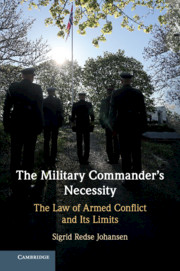
-
Select format
-
- Publisher:
- Cambridge University Press
- Publication date:
- September 2019
- October 2019
- ISBN:
- 9781108637060
- 9781108493925
- 9781108713610
- Dimensions:
- (228 x 152 mm)
- Weight & Pages:
- 0.77kg, 448 Pages
- Dimensions:
- (229 x 152 mm)
- Weight & Pages:
- 0.66kg, 452 Pages
- Subjects:
- Public International Law, Law, Humanitarian Law
You may already have access via personal or institutional login- Subjects:
- Public International Law, Law, Humanitarian Law
Book description
The idea of military necessity lies at the centre of the law of armed conflict and yet it is less than fully understood. This book analyses which legal limits govern the commander's assessment of military necessity, and argues that military necessity itself is not a limitation. Military necessity calls for a highly discretionary exercise: the assessment. Yet, there is little guidance as to how this discretionary process should be exercised, apart from the notions of 'a reasonable military commander'. A reasonable assessment of 'excessive' civilian losses are presumed to be almost intuitive. Objective standards for determining excessive civilian losses are difficult to identify, particularly when that 'excessiveness' will be understood in relative terms. The perpetual question arises: are civilian losses acceptable if the war can be won? The result is a heavy burden of assessment placed on the shoulders of the military commander.
Reviews
‘Johansen’s contribution is an important one that adds to the repudiation of the discredited, but stubbornly irrepressible, concept of kriegsraison geht vor kriegsmanier-the assertion that 'necessity knows no law.'’
Beth Van Schaack Source: American Journal of International Law
Contents
Metrics
Altmetric attention score
Full text views
Full text views help Loading metrics...
Loading metrics...
* Views captured on Cambridge Core between #date#. This data will be updated every 24 hours.
Usage data cannot currently be displayed.
Accessibility standard: Unknown
Why this information is here
This section outlines the accessibility features of this content - including support for screen readers, full keyboard navigation and high-contrast display options. This may not be relevant for you.
Accessibility Information
Accessibility compliance for the PDF of this book is currently unknown and may be updated in the future.


